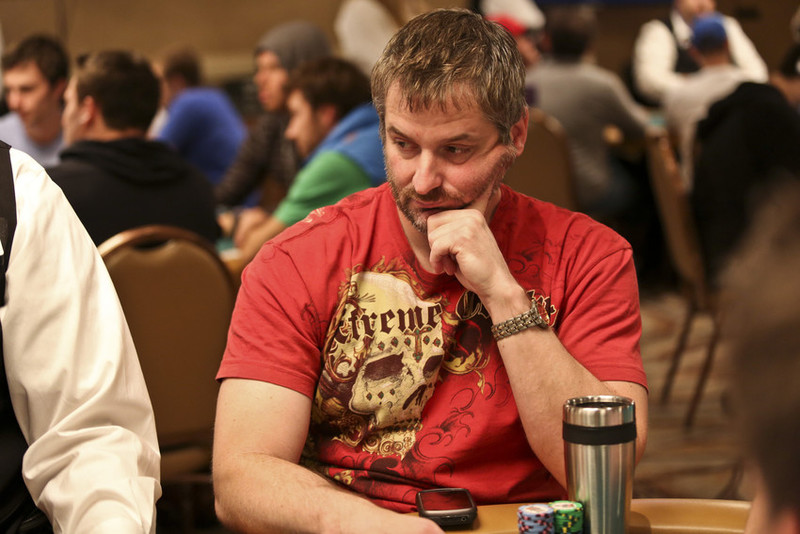






Tony Cousineau: 'It Might Actually Suck When I Win A World Series Of Poker Bracelet'Poker Pro Says Finally Capturing Gold Might Be A Letdown |
|
|
 To say Tony Cousineau is due is a mammoth understatement.
To say Tony Cousineau is due is a mammoth understatement.
After Thursday’s exit deep in a $3,000 no-limit hold’em event at the 2014 World Series of Poker, the Floridian now has 65 cashes on poker’s biggest stage, which puts him eighth all-time. There’s just one problem—Cousineau has never won a bracelet.
He’s nearly 20 cashes ahead of Tom McCormick, who also owns zero bracelets.
“I had my shot yesterday at the final table, but didn’t quite do what I wanted to do,” said Cousineau, who also finished eighth in the $5,000 no-limit hold’em eight-max event on June 18. “I get to keep intact my illustrious record of no bracelets and 10 billion cashes.”
Make no mistake about it, Cousineau, who is approaching 50, wants to win. However, he does take an odd sense of pride in his record and the attention it brings. “Everyone always says, ‘you have the most cashes without a bracelet,’ and I’m like, ‘is that a jab in the side or a compliment?’ I can’t really tell.”
Finally being the last-man standing in a bracelet event would obviously be a huge relief and a sweet feeling, especially when awarded the prize money, but for Cousineau a win would also be a loss.
“It’s like everyone knows about it, and it’s one of those things where it might actually suck when I win a bracelet—if I win a bracelet—because I’ll just be one of the gang then,” he said. These days, the WSOP awards more than 60 bracelets every summer—and the summer festival is still growing.
A Cousineau heads-up match for a piece of WSOP hardware, which has never happened (Cousineau’s top finish ever was a fourth-place in a 2001 limit Omaha event), would likely be a big draw, possibly filling the spaceship-shaped structure in the Amazon Room at the Rio Convention Center. With a low-profile and friendly demeanor, Cousineau is well-liked within the poker community, though some of the loudest cheering might not come from friends but from those in the stands who have money on the line.
“There are a few people with bets out there,” Cousineau said. “I know Erik Seidel made some kind of big bet on me that I would win a bracelet in the next three or four years, with some other big money guys, so I know he’d be there cheering if I got heads-up.”
Cousineau could have seven cashes this summer, instead of six through about the mid-way point, if he hadn’t been the bubble in a pot-limit Omaha event in early June. “I literally bubbled it with aces in the big blind…there’s nothing I hate worse than bubbling a poker tournament. It has nothing to do with the money; it’s just the sickness of being just one away from cashing. It’s a mental thing,” he said.
Cousineau said he has been using the same tournament strategy for the past 10 years or so (he has played at the WSOP for 15). He explained that “you can’t teach an old dog new tricks.” With that being said, Cousineau has picked up little moves over the years and made some minor adjustments, thanks to learning from some of the high-volume online players who historically have cashed in more tournaments in just a few months than Cousineau has lifetime. As the adage goes, poker takes a day to learn, but a lifetime to master—and Cousineau is still perfecting his craft, even if that skill appears to be simply min-cashing.
“If you can’t join [the online players] with the way they play the game, you have to have counter measures in place to keep yourself with some chips,” Cousineau said of the tweaks he has made to his strategy without totally revamping anything to do with his overall approach.
While many live poker players agree that once you fall to around 15-20 big blinds you are in the danger zone and basically need to make a move pretty soon, Cousineau feels comfortable grinding out a stack of just a handful of big blinds. “I don’t think that panic sets in until around six big blinds,” Cousineau said. “I am a little more lenient in being able to fold and not putting myself at risk until the last moment.”
He added that despite the streak of cashes without a bracelet growing longer with every summer he actually has become more conservative in recent years as play nears the money bubble. It comes back to him relishing his little piece of poker history, no matter how painful hitting the rail prematurely is.
According to Cousineau, his ultra-tight play prior to the money bubble probably has given him 20 extra in-the-money finishes over his poker career. Though, he admits, it might have cost him a few more final table appearances. It’s a trade-off, but one that Cousineau doesn’t think about too often anymore. He said he is willing “to live and die” by his method of sneaking into the money.
“I have been able to stay in the game for more than 10 years and not have to get backing and do what a lot of players do,” he said. “Maybe that’s to my own peril, but it’s where I am comfortable. I try to teach some of my friends the benefits of the way I play, but I also try to learn the benefits of the things they do. It’s a constant evolution trying to improve. Currently, I’m happy with the way things are going.”
